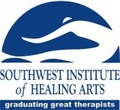In one form or another, distance education has been around for well over a century. It was an effort to bring formal training to students who could not otherwise attend school. Starting with postal service, educators soon added the telephone, radio, and television to their tool belts.
For somewhat less time, sixteen years, Southwest Institute of Healing Arts (SWIHA) has offered high quality and affordable classes focused on touching lives, healing bodies, and freeing souls – providing and supporting students with the opportunity to transform their lives.
In the early to mid 1990s (shortly after SWIHA began), eager professors added computer communication to their list of tools. Now, with a cornucopia of well-developed learning platforms (Angel, WebCT, eCollege, Blackboard, FirstClass, Moodle, etc…) online courses can be engaging, dynamic, full of content, and rich with discussion. Modern learning platforms allow anyone with basic computer skills (not just us geeks) the ability to take an online course. Add a simple web-cam, and a free program like SKYPE, and students can see and interact with their peers and instructors.
In those early days of online learning, instructors delivered courses through bulletin board services (BBS). These were little more than electronic correspondence courses, restricted to computer users with 2400-baud modems and no fear of what was “under the hood.”
However, they marked the beginning of an educational revolution (one much broader than technology alone – but more on that later). In fact, the Sloan Consortium’s 2008 report shows online learning continues to grow year-over-year. And, contrary to what you might think, the most popular programs are health professions and related sciences, not computer information and engineering.
Our realization came from the ever-increasing empty spaces in people’s spiritual, emotional, and physical lives. Apparent In the news, on the tv, and within email spam we felt the need to extend our spirit to as many people as possible. It is in response to this, and students’ demands, that SWIHA began offering online courses in the spring of 2009.
Now, students around the world benefit from online learning’s convenience, flexibility, and learner-centered nature. They connect in real-time with leaders in their field regardless of their location. Seminars like the World Massage Conference (http://www.worldmassageconference.com) bring together experts from around the world in weeklong seminar students can attend from the comfort of their own home or office.
But – here is the really cool part I mentioned earlier – now that technology and access concerns have mostly faded into the background, educators are focusing on creating instructional and learning theory that leverages the endless possibilities of online education, and the connections and possibility it creates.
In a recent report, the US Department of Education (USDOE) evaluated online learning (blended and fully online) in relationship to face-to-face instruction. They found it has a measurable learning outcome advantage compared to face-to-face. This is not due to the delivery medium, but to increased time on task, greater accessibility to resources, and overall teaching differences in blended and online learning.
Most significant to a holistic way of life, Green Healthcare, and SWIHA is the USDOE’s discovery of the overwhelming effectiveness of self-reflection, self-monitoring, and concepts of transformational learning. Requiring students to reflect on, and internalize their learning at all levels naturally leads them to retain more information, and apply it to their lives on a regular basis. It also encourages development of emotional intelligence (EQ), and prepares them for the coming of what Daniel Pink calls the “conceptual age.”
Having been a part of SWIHA for so long, transformational learning seemed natural to us. But, extending that into the online environment has been one of the most invigorating and rewarding of experiences. Embracing this approach online will help students not only be more successful in the classroom, but also more successful in life.
Online learning truly allows students and instructors to transcend space and time. Like education, SWIHA’s transformation is far from complete – in fact, we may never be done. But this journey is not to be missed.
Brad Boute is the Director of Online Education at Southwest Institute of Healing Arts. SWIHA is a conscious college community in Tempe, Az. Brad is studying for his Ph.D. in Educational Technology, and his blog about the subject can be found at http://r-elearning.blogspot.com. To contact him directly, please email bradb@swiha.net. For more info on SWIHA please see: http://www.swiha.edu.
Additional Resources covering Holistic Health can be found at:
Website Directory for Holistic Health
Articles on Holistic Health
Products for Holistic Health
Discussion Board
Southwest Institute of Healing Arts, The Official Guide to Holistic Health

Post new comment
Please Register or Login to post new comment.